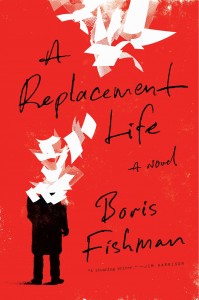
A Replacement Life
Boris Fishman
HarperCollins
2014, pp. 336, $25.99
by Rabbi Rachel Esserman
Some critics claim that the Golden Age of American Jewish fiction was the 1950s and 1960s and due to a combination of the horror of the Holocaust and the struggles of second- and third-generation immigrants. They even suggest that Jewish American writing is passé – that everything produced today is a rehash of old themes. These critics have obviously not read the exciting novels and memoirs by a new group of immigrants: Russian American Jews. While not all the literature produced is equally successful, it’s almost uniformly interesting and provocative, as demonstrated by A Replacement Life by Boris Fishman, which shows just how different American and Soviet sensibilities are.
For Slava Gelman, Fishman’s main character, the American dream includes living in Manhattan and working for an American institution, Century magazine. However, as hard as Slava works to escape his family, he finds himself drawn back to the Russian Jewish community in Brooklyn, especially after his grandmother dies. Finding a balance between his Russian and American selves proves difficult.
Slava dreams of having an article published in Century magazine, (loosely based on The New Yorker), which he sees as the epitome of American journalism and fiction. He desperately tries to pitch the perfect story to its editors after carefully analyzing the variety of material published. Nothing he offers is accepted.
His hard work does have one consolation: Arianna Bock, a fact checker for the magazine, who not only finds him attractive, but offers him a different view of American Jewish life. Arianna is also looking to escape her family: Her parents, who became Orthodox, are no longer interested in the arts, something over which she and her father once bonded. She also doesn’t believe the magazine has a monopoly on the correct way to write and encourages Slava to find his own voice.
When Slava joins his family in Brooklyn for his grandmother’s funeral and shiva, he realizes just how little he knows about her. A Holocaust survivor, she refused to speak about her experiences. He regrets not learning more about this woman who cared for him in ways that no one else ever will. He’s given a chance to explore her life when, after the funeral, his grandfather, Yevgeny, shows him the reparation form his wife never used. His grandfather has an interesting idea: Slava should fill out the form so Yevgeny can receive money from the German government based on his wife’s experiences.
At first, Slava refuses, but his imagination soon takes hold. Perhaps he can learn to understand his grandmother by inventing her life. This writing is far different – and far better – than anything he has submitted to Century. When his grandfather offers Slava’s services to other Jews in similar situations, Slava finds his calling. He take details from these people’s lives and embroiders them, details “that made for good stories – stories that stay with him days after he’s written them.”
Unfortunately, while the Russian community has no problem with what Slava is doing, Arianna objects to what she regards as lies and fraud. Slava wonders if this is because as an American, Arianna has not suffered like his relatives and their friends. He can’t help but think, “What if Arianna had eaten potato peels for breakfast and dinner (no lunch) for a year? If she had watched the pale skin come off her legs from wading in swamps day after day? Would she be of two minds then? Could she go for sixty years without mentioning what had been taken, six years without complaining as her body undid itself? And if grandmother had been born in America, would she object like Arianna?” The last question is one he doesn’t want to contemplate.
Nevertheless, his conflict with Arianna forces Slava to look more carefully at his life. He has to decide whether his heart and soul belong to an America that sees the world in black and white, or to a Russian heritage that accepts many shades of grey. Slava finds himself drawn to the world he thought he left behind when he moved to Manhattan: to those immigrants who are trying to recreate their Russian past in Brooklyn, rather than assimilating to American life. As he begins to explore what took place during World War II, he sees them differently, realizing that their experiences created a different sensibility: for example, the idea that truth might not be totally objective – that Russian Jews “lied about everything so the one truth at the heart of it – that abused people might flee the place of abuse – could be told.”
At first, A Replacement Life seems like another novel about a confused young Russian in America. But as the novel progresses, something changes: As Slava embraces the history of the older generation of Soviet Jews, the writing grows in depth and breadth. Fishman raises fascinating questions about how people endure generations of hardship and persecution, particularly their need to bend the truth to survive hostile conditions. And how difficult, sometimes impossible, it is to adjust to American life. Slava is one of the few who wants to become American; in the end, he acknowledges he may not be able to escape his own Russian psyche.
Rabbi Rachel Esserman is the executive editor of The Reporter Group, which publishes five newspapers in New York, Pennsylvania and Connecticut.


